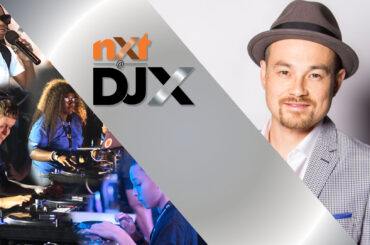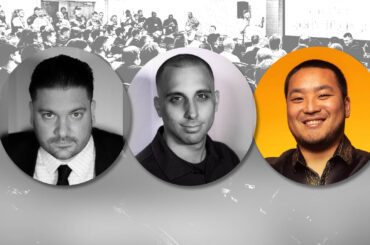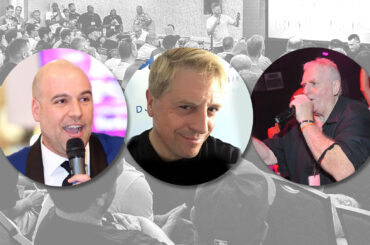The conventional trajectory for an electronic-dance music artist is to start as a producer-cum-DJ and later, maybe translate that into some type of live presentation.
Pete Dougherty, known professionally as Moon Boots, went about it the opposite way. The Brooklyn-based producer/DJ had a more traditional musical background and made the move to Chicago post graduation from Princeton (with his music degree), to join the ready-made group Hey Champ. In the process, he immersed himself in that city’s storied house music scene from the ground up. Dougherty then parlayed Hey Champ’s offshoot DJ gigs into a solid stand-alone career for himself.
Classically trained on the piano, Dougherty spent enough years as the hotel and restaurant DJ, purposely remaining anonymous until he was ready to start producing his own music. Around the 2010 mark is when he estimates his livelihood solely coming from music began.
“It’s pretty easy to live in Chicago on less than you would in a coastal city,” says Dougherty. “I never had a job that paid well, so I got used to never having much and I never felt I was getting a pay cut doing this.”
Since returning to his birthplace of Brooklyn in 2013, Dougherty has populated international dance music environments with a steady stream of carefully crafted singles and in-demand remixes in the deep-house vein. Initially, his releases came under the umbrella of French Express, which he co-founded, and after that brand’s dissolution, as part of the Anjunadeep family. Unlike most present-day producers who diversify their output across a number of labels, Dougherty’s focus is on keeping his allegiances singular.
“It works better for me,” he says. “You form a much closer relationship with your A&R people. It’s much more personal. You can make your releases fit into each other into a larger story, instead of a track here, a track there.”
Up until now, Dougherty’s productions have had the dancefloor as their focus, but his new artist album, First Landing, allowed him to explore further moods, tempos, genres, and employ original vocals instead of samples—a liberating experience for the producer. A groove-based listening album, First Landing, moves at a mellower pace than previous releases, as it offers delicate, soul-flecked songs like “Power” (featuring Gatsby), spooky emotive ones like “Stranger Things” (featuring King Kona), and crossover-ready cuts like “Utopia” (featuring Janielle Kroll). On the other hand, First Landing has its instrumental moments such as on the robust rhythms of “Red Sky” and the introverted reflection of “The Life Aquatic.”
Unlike many electronic producers, Dougherty doesn’t make his music at home. Instead, he uses an off-site studio space that’s surrounded by other creatives, including Nic Hanson, who turned up on First Landing for the graceful “Keep the Faith.”
As is expected from his formal music education, much of Dougherty’s sound sources come from synthesizers, both outboard and virtual, in combination with each other. Some of his key favorites are classics from Roland: Juno 106 (“the one I’ve owned the longest”); SH-101 (“bass on nearly every song”); D-550 (“for new jack early ‘90s vibes”); JV-1010 (“unique sounds you can’t edit, it’s own kind of cool”); as well as Moog Voyager and Dave Smith Mopho x4.
What is prevalent on First Landing is a distinctly organic feel, a possible attribute of Dougherty’s traditional music background. “Instead of starting with the sound design, I start with a song structure in place, having distinct sections mapped out and then filling them in,” he explains. “Chord progressions are really important for me. It’s rare that a track will have the same progression or bassline moving through the whole time. I want to make sure the different sections interact, connect and flow into each other and contribute to building certain feelings and emotions.”
Synths also are finding their way into select sets in Dougherty’s DJ schedule. “It’s nerve-racking and so much can go wrong, but it’s great in the moment,” he says. “I’ve always loved to play keys. It gives me something else to do, especially if the track is stripped-down and I feel I can add more to it harmonically, or double a really cool part. There’s a lot you can do. I’m just getting used to it. It’s a lot of fun.”
Synths or not, Dougherty’s sets are guaranteed crowd-pleasers, and not because he picks the obvious tracks, but because he creates a tangible vibe. Percussive and deep, his style shifts just enough to fit into a daytime pool party, a festival atmosphere, or a late-night club environment.
“I go more by time of day than anything else,” says Dougherty of his selections. “The main difference is festival sets are shorter and you only have so much time to get people’s attention, so it tends to be quick-mixing of heavier tracks that sound good on an enormous system. At a day party, I’ll make it brighter, more fun; at night I could get into darker territory.”
For any set in any situation, however, playlist preparation remains key. “For each set, I’ll make a playlist of 30 to 60-plus songs I think would be a good match for where I’m going and I’ll have it organized so related sets are close by in the same subfolder,” he continues. “I’ll have another subfolder that’s organized by a cross between the time of set and the genre. I’ll have one playlist of what I call ‘enders,’ which are fun edits, goofball tracks that are a little leftfield, but fun for the crowd to get into.
“I’ll have times where I’m not sure how it’s going and I need to lean on something that works from previous sets. I move the histories of the sets I consider to be successful and add those in a folder so if things are not clicking, I’ll jump over to that for a few minutes and get things back on the right track.”







